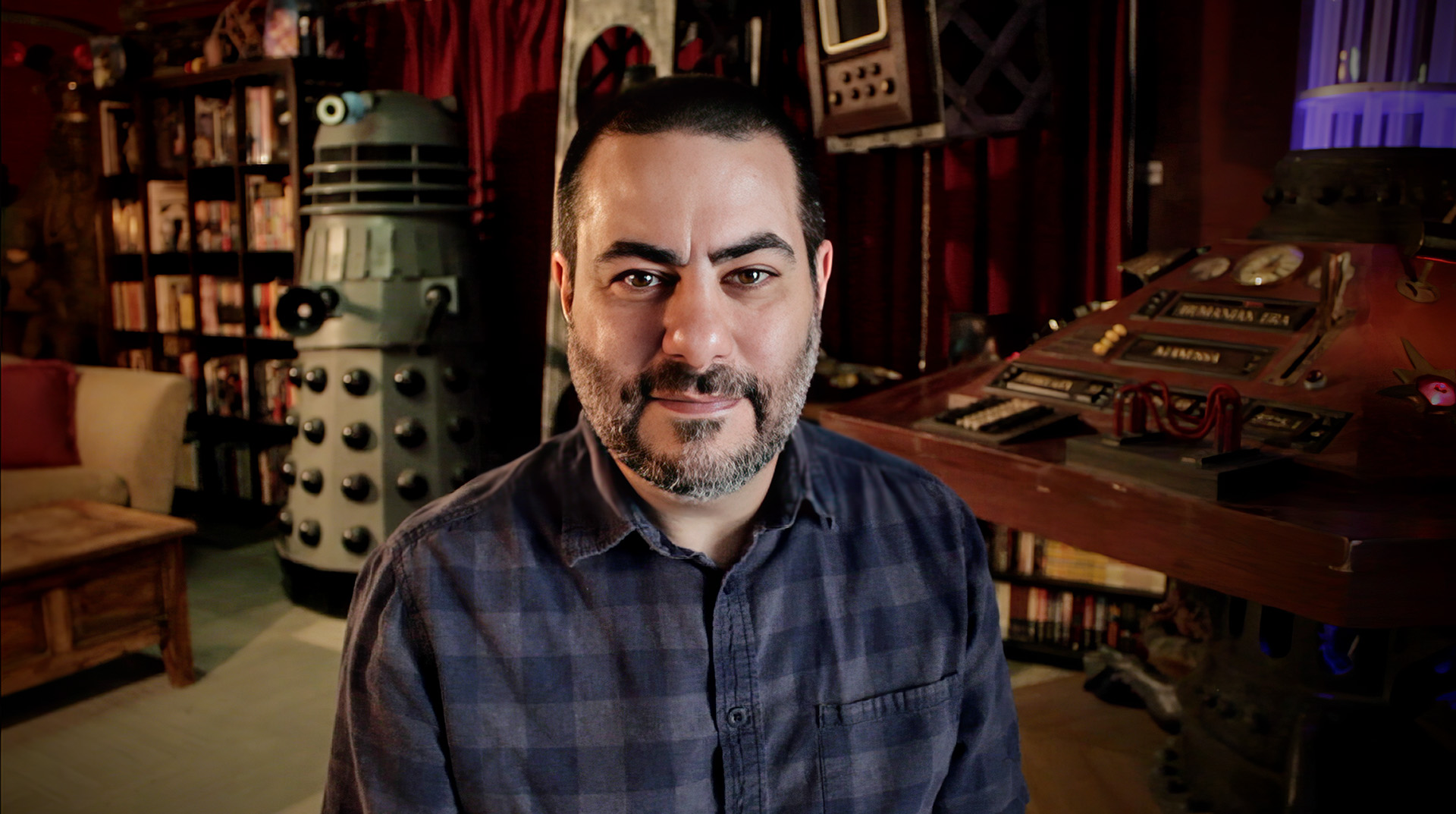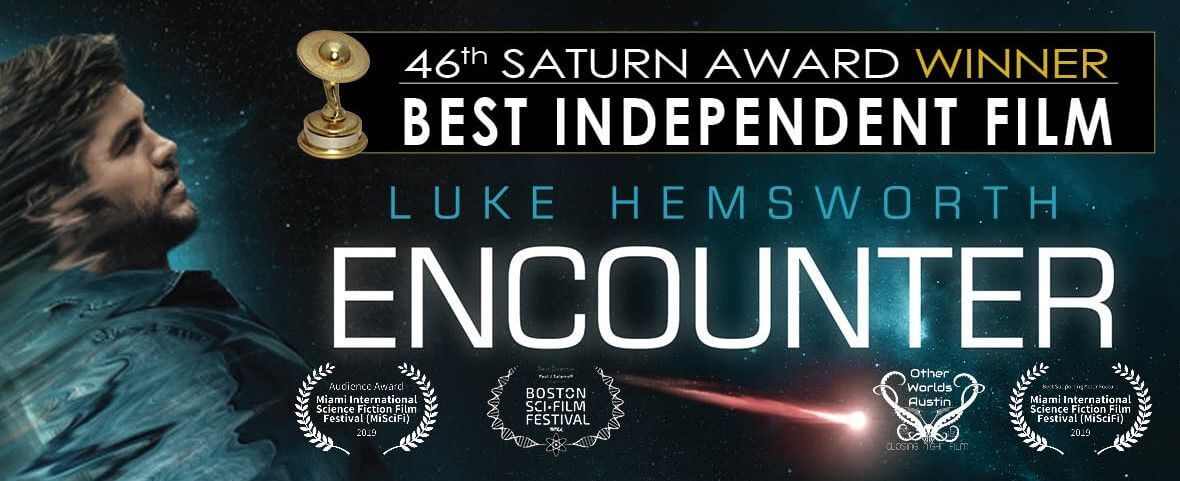Eight Takes on Writing
Paul J. Salamoff on storytelling, passion, and the difference between good and bad feedback

PAUL J. SALAMOFF has been working for over 35 years in Film, TV, Video Games and Commercials as an award-winning Writer, Producer, Director, Executive, Comic Creator, Storyboard Artist and Make-Up FX Artist. He is the author of ON THE SET: The Hidden Rules of Movie Making Etiquette and teaches screenwriting at The New York Film Academy. His feature-film directorial debut ENCOUNTER, a Sci-Fi/Drama based on his original screenplay that stars Luke Hemsworth, Anna Hutchison, and Tom Atkins won “Best Independent Film” at the 46th Annual SATURN Awards.
- What qualities make for a great writer? I guess for me, it's the passion. It's really caring about the story I'm telling and wanting to get it out there, share it with the world. And that I'll put in the time and effort to do that, and to make it as special as I can. Being able to look at it objectively, do some rewrites, but at a certain point also deciding..."Okay, I think this is ready to share with the world," and recognizing when that moment is.Right, right. Which I'm sure some of that comes from experience. What kind of qualities do you see in others that make you think, "That could make for a good writer?" We get this question a lot. This is good because I teach screenwriting on the side at New York Film Academy, and I've been doing that for over five years. And it's about recognizing which students really have what it takes. Like I said, passion is the key thing for me. Also, being able to recognize your abilities, put in the work, and take the time to develop. But I always tell my students, "Don't be too hard on yourself.” “Don’t beat yourself up." This is an art form, a creative endeavor. You're a storyteller, so you're trying to tell the best story you can tell. But also, I believe in the 10,000-hour rule: the more you write, the better you are as a writer. It's good to walk away from a story sometimes, then come back with fresh eyes.
- What are some common misconceptions about your role that you’d like to clear up? There’s so much work that goes into crafting stories before you even start writing. There’s a lot of internal work. Every writer has their own process. For me, I need to see the movie in my head before I start writing. I think I've written over 35 screenplays, teleplays, comic books, and essays. I've gotten faster, but I still need to visualize it first. It's like watching a movie in my head before I type it out. Once I see it, I can write a quick outline, but I always let the story be organic. The misconception is that writing is easy, but it’s not.Or that the process is just writing, when the process is so much more than that. Exactly. Once I sit down to write, the story becomes alive, and the characters are so alive that they're dictating the story. And it's telling itself at that point, you know. If my characters are saying no, we're going to go this way, we're not going that way. Then I'm just going to follow my characters. It’s sort of like a trip you take. Let's say you're going to take a trip across the country. What do you do? You know where you're starting from, and you know where you're going. You get in your car, you, turn on your navigation, and get the directions to get from here to there. Now you can take that journey, and sometimes that's like my first beat outline. There might be a car accident, or there might be a road closed, or whatever. Sometimes, you’ve got to allow yourself to take a different path, even though you know the direct route to get from point A to Point B. And as you take that different path, you might decide you don't want to go to this location anymore. You want to go up here and follow that. And then you go up there and follow where the story takes you. Once you get into that process of writing it, especially when the characters come alive, you've got to follow. You've got to follow those instincts, because it's storytelling. It's an art form.
- At what point in your process of writing do you bring in collaborators or start getting feedback? I like to try to keep the story inside me as much as possible until I write it, because if I tell the story too many times before I write it, I lose that passion because it feels like I've told the story and now it feels like a chore as opposed to fresh. This is the first time I remember writing the scene as opposed to, I've now told the scene twenty times. I don't like to share my work until I have a really clean first draft, because I don't like to waste people's time, and I also like to feel confident in what I'm writing that it's got to be the story that I want to tell. It's interesting because, there's awesome, great feedback. And then there's bad feedback. My students ask me a lot, how do you recognize a good note from a bad note? Well, a good note is one that you're excited to tackle. One that's great, and you can't wait to jump back in your script, and “Oh, God! I wish I thought of that.” A bad note is one that changes the story in a way that takes you away from the story you’re trying to tell.
- We had a goat. Can you share a story where a last-minute script change led to a breakthrough or created chaos on set? With my film ENCOUNTER, one of the best notes I got was from Matthew Jacobs, a writer and a friend who’s just phenomenal. He’s someone I trusted, and I showed him an early cut of my film. And it had this big reveal at the end. I felt it was so clever, keeping this thing a secret up until the end of the film. He said, “We should know he has a daughter.” And although it was only part of the reveal, he thought we should introduce it earlier in the film or it was at the detriment of our main character. We would empathize with the character so much more, revealing this one fact earlier. Although it’s hard to change things this late in the game, luckily, it was easy to fix, and it worked. I will always give Matthew credit for that, and the movie went on to win multiple awards. If I hadn’t made that change, maybe it wouldn’t have.
- What kinds of tools do you use in your job? I write in a lot of mediums. Right? I've written short stories, novels, nonfiction, comic books, and screenplays. They're all different formats. So, you want the best tool for each format. For screenplays, phase one is using the brain. Phase two is using a pad of paper and a pen when I do my beat outlines, because I can write faster than I can type. And then Phase 3 is sitting down behind the computer. For comics, I might use InDesign, because I’m setting them up very graphically. The way I present them is just as important as the words.
- What is the best part of your job? When I’m in the zone, using my creativity, getting the story out of my head onto the page and feeling good about what I’m writing. Also, I could never be the writer in the coffee shop with all the noise and distraction around. I like to be in my “safe space” when I'm when I'm writing. By that, I mean, in my office, surrounded by the things that inspire me. I put on some film scores with music that fits the genre of whatever I’m writing, that’s where I find the most joy.
- What advice would you give to someone trying to work as a writer today? Obviously, be passionate about what you’re writing. You need to be in love with the story you're telling. You need to be in love with your characters and understand them. Passion will always come through, as far as I'm concerned. I was just teaching a class yesterday, and we were talking about structure and formatting. And sure, you have classic structure, the three act structure, and you know the way a story is told. But you know we're storytellers. The format is not the most important thing. If you tell a compelling story, you've told a compelling story. And I remember when I was an executive reading a lot of scripts, you could tell which scripts had that passion because it would explode from the page. People who read it, won’t want to put it down.
- It’s a bit of tradition here at Scripto, that we share Dad Jokes. What is your favorite Dad joke? OK. Why don’t aliens eat clowns?I don’t know, why? Because they taste funny.

Visit Paul's website for a deeper dive into his work.
Back to storiesReady to get started?
Scripto is free for up to 3 collaborators with our basic studio and screenplay formats. Sign up now and try it out!
For larger teams, we tailor plans and pricing to your team size, production order, and feature needs.
Interested in learning more?
Get in touch for a customized demo and free trial of our paid features, or any reason at all!
